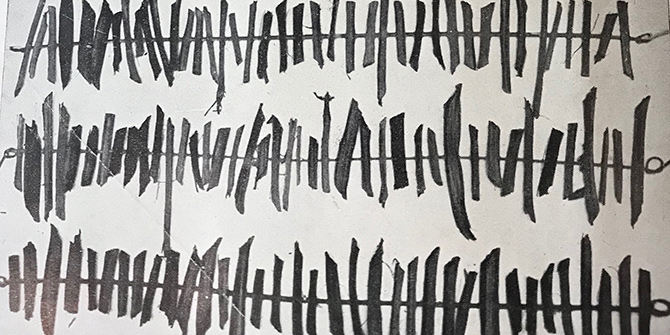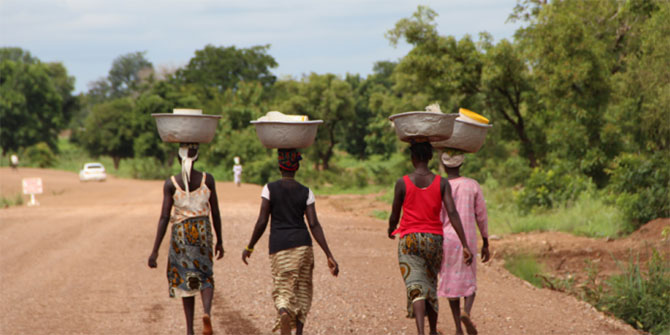LSE alumna Marissa Jackson discusses how the award-winning documentary 30%(Women and Politics in Sierra Leone) emphasises the challenges women face in the battle for gender equity.
Almost four years after the enactment of Senegal’s controversial Gender Parity Act (Parité), which guarantees women and men 50-50 representation in the legislature and on the ballots, some Sierra Leonean activists are fighting for women to have representation in the country’s lawmaking body.
A new award-winning documentary, 30% (Women and Politics in Sierra Leone), follows the struggle of Minority Leader Bernadette Lahai and feminist activist Barbara Bangura to create this space for women in Sierra Leone. The documentary is so titled because these activists have been fighting for over a decade for 30% female representation in the Sierra Leonean legislature.
Voice, place and space—and their relationships to power– are notable motifs in 30%. Madame Lahai recounts her inability to fit into “traditionalist” Sierra Leoneans conceptions of women’s spaces and places early on in her childhood and throughout her adulthood by discussing her affinity for whistling. According to Lahai, some Sierra Leoneans find women’s whistling challenging, and therefore offensive. In the film, she recounts that her own mother considered whistling unladylike and believed that women should be silent. Lahai notes that she still enjoys whistling—proof of her strong character—and that people call her a “man” when they hear her indulging her habit. She has spent her life inundated with the negative response of those who believe that whistling, speaking, and voicing opinion in any form that upends traditionalist norm is an abomination. Indeed, the opening scene of the documentary shows a shouting Lahai being booed by men in Parliament as she loudly advocates for women’s access to government positions.
Taboos against whistling women are not uniquely African. Rather, “a whistling woman and a crowing hen are neither fit for God nor men” is a traditional British saying, while its American variation claims that “a whistling woman and a crowing hen never come to a very good end.” In all cases, the message to women is that they are meant to be silent, so that no one will notice their occupancy of physical space. Lahai notes explicitly that the 30% Bill for which she is advocating is meant to give women political “space to increase [their] participation in governance.” Bangura notes that women who insist upon participating in politics (in taking up space and utilizing voice) are accused of being bad women—prostitutes, and sexually promiscuous tarts—engaged in dirty, masculine work, because women’s worth and virtue are attached to their silence and their containment in the domestic sphere.
In order for women to achieve true autonomy, they must be able to create space for themselves that is not attached to, nor situated next to, that of men. Another activist in the film, Salamatu Kamara, reiterates this sentiment, claiming that “politics is about creating a space for yourself.” While living in Dakar in 2013, I noticed that attitudes towards gender were also expressed in explicitly spatial terms. Women and men alike expressed to me that they did not support Parite because women were “derriere les hommes”. While unmarried women were under the authority of their fathers or uncles, they often considered themselves to be with their mothers.
Perhaps this paradigm is universal. After all, Americans have been known to call upon their women, in sexist, if not misogynistic fashion, to stand by their men. The phrase “Behind every good man is a great woman,” seems to never die. Thus, even the concepts of subjugation and marginalization are tied to ideas of space and place.
Consequently, gender equity is fundamentally about voice, place and space. In patriarchal societies, women are placed behind, under, after, spaced small, and muted. The expectation in Sierra Leone, as in many places around the world, is that women should remain in the kitchen and not in politics, as if politics is as tangible as a physical kitchen. When women enter politics, they become large, before, in front of, and on top of, in the eyes of those invested in male domination and gender-based hegemony. They become a threat to society as ordered. The presence and absence of women in African governments is particularly notable because the African continent has demonstrated greater willingness to include women in the political process—primarily via quotas–than any other region in the world.
The effectiveness of quotas in securing women’s human rights and strengthening democracies is not clear; however, it is clear that the exclusion of women from political processes is not only a violation of human rights, but highly detrimental to any society. Therefore, while nations figure out how best to provide women access to decision-making, it is also equally important to call attention to overarching paradigms concerning gender, space, place, and voice. Until women are considered equal in all aspects—by men and women alike—not just as human beings or as a statistical quota, but as shareholders in space and noise—the battle for women seeking political power will always be uphill.
This post originally appeared on CompareAfrique.
Marissa Jackson is an attorney, presently based in Detroit, Michigan, where she is clerking on the United States Court of Appeals. She is also the founder of 4th World Initiative, Inc., a human rights-focused charitable foundation. Marissa is a graduate of Northwestern University, Columbia Law School and the London School of Economics, and she writes on women’s human rights, refugee law, post-colonial legal theory, and the evolutions of legal paradigms in West Africa.





